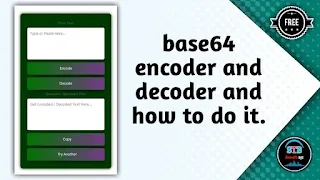
|
| base64 encoder and decoder and how to do it. |
Base64 encoding and decoding are techniques used to represent binary data in a format that can be easily transmitted over text-based protocols, such as email or HTTP. In this article, we will delve into the details of Base64 encoding and decoding, its working principles, and its various applications.
What is Base64 Encoding?
Base64 encoding is a binary-to-text encoding scheme that converts binary data into a set of 64 characters. These characters consist of the 26 uppercase letters (A-Z), the 26 lowercase letters (a-z), the digits 0-9, and two additional symbols: "+" and "/". The "=" character is also used for padding purposes.
The encoding process takes every three bytes (24 bits) of binary data and divides them into four groups of six bits. Each six-bit group is then converted into its corresponding character from the Base64 character set. This process continues until all the binary data has been encoded.
Base64 Encoding Applications
Base64 encoding finds application in various domains, including:
1.Email Attachments: Base64 encoding is commonly used to attach binary files, such as images or documents, to email messages. By encoding the files, they can be sent reliably across different email systems that may have restrictions on the types of characters they can handle.
2.Data Transmission: When transmitting binary data over text-based protocols, such as HTTP or XML, it is often necessary to encode the data using Base64. This ensures that the data remains intact during transmission, as text-based protocols can sometimes mishandle or interpret binary data incorrectly.
3.Data Storage: Base64 encoding is used in certain data storage scenarios, such as storing binary data in XML or JSON files. Since XML and JSON are primarily text-based formats, binary data needs to be encoded before being embedded in these files.
What is Base64 Decoding?
Base64 decoding is the reverse process of Base64 encoding. It converts the encoded Base64 data back into its original binary form. The decoding process takes each set of four Base64 characters and converts them into their corresponding binary representation.
Base64 Decoding Applications
Base64 decoding is primarily used to retrieve the original binary data from its encoded form. Some common scenarios where Base64 decoding is necessary include:
1.Processing Email Attachments: When receiving an email with Base64-encoded attachments, the recipient's email client or server needs to decode the attachments to retrieve the original files.
2.Handling Web API Responses: Web APIs often return data in Base64-encoded format, especially when dealing with binary data. Developers need to decode the data to extract the original information.
3.Parsing Data from Files: When working with XML or JSON files that contain Base64-encoded binary data, the data needs to be decoded before it can be used or manipulated.
Conclusion
Base64 encoding and decoding are essential techniques for representing binary data as text, enabling its transmission and storage in text-based environments. By converting binary data into a set of 64 characters, Base64 encoding ensures that it remains intact and portable across different systems. Conversely, Base64 decoding allows the retrieval of the original binary data from its encoded form. These techniques have numerous applications in email attachments, data transmission, and data storage scenarios. Understanding Base64 encoding and decoding is crucial for developers working with binary data in text-based contexts.
Related Posts
Thanks for reading: How to encode and decode Base64? and details, We have the articles you like. We think these articles are very necessary for you :)